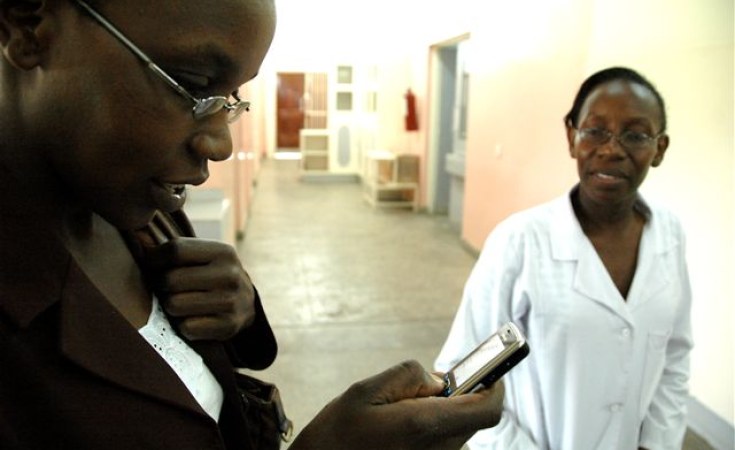Each year, millions of people die from preventable diseases. At the recent 2010 mHealth Summit in Washington D.C., Bill Gates, chairman of Microsoft, discussed the opportunity for mobile technology to help reverse this tide by supporting vaccine and patient information delivery. We should also look to seize the opportunity that the growing reach of cell phones presents to improve access to life-saving medicines.
Mobile health (mHealth), or the use of wireless networks and mobile devices to support health care, offers several solutions and models of success. Already, tools like Ghana-based Sproxil and mPedigree are enabling health providers and consumers to use mobile technology to track and verify the origin and authenticity of their medications. At the mHealth Summit, I chaired a panel with representatives from the diverse groups that are needed at the table for this discussion: the pharmaceutical industry, academia, the telecommunications sector, non-profits and social enterprises. We tackled issues of drug affordability, appropriate use of medicines and supply chain dynamics, and the surge in pilot programs using mHealth solutions to deal with these issues.
We must now ask the questions: how can we best use information and communication technologies (ICTs), particularly mobile, to enable better data and health information transfer at key delivery points? And more importantly, how can these technologies be incorporated into larger efforts to deliver essential medicines and lead to overall health system strengthening?
Prashant Yadav, a global health supply chain guru, remarked that his research shows that "better information flow outperforms holding more [drug] stock closer to the health facility." It appears that we need to rethink how we approach and design strategies for improving access to medicines and how to incorporate all available tools at our disposal.
To do this, we should consider the following:
1) The need to motivate individuals and organizations to submit data and information is crucial. Without information, there is no way to inform decision-making, especially when it comes to time-sensitive actions like the allocation of resources and commodities. This includes the ability to reduce stockouts of vital medicines and vaccines, manage inventory, track patient outcomes, forecast demand and more. During a recent mHealth pilot led by Pfizer, individuals were given incentives for collecting and submitting data via their mobile phones. This incentive program resulted in a 95-99 percent submission rate, creating an incredible increase in the amount of information being shared. Now that we know that incentivizing is critical to enabling the flow of data, our challenge is how to subsidize those incentives in a sustainable way. Who should bear that cost? And what is the role of the telecommunications industry?
2) Leveraging mobile financial services (mMoney, mBanking and the like) to help improve access to medicines and drive both supply and demand for related health services. Mobile finance tools can be used to determine when, where and how money is flowing throughout the global health supply chain. The flow of financial data related to health has the potential to increase transparency about the cost of drugs, contract execution, budget allocation and the efficiency of donor financing. Such transparency also has the potential to reduce corruption and decrease counterfeiting activities. With the ability to track and trace drugs, manage inventory, and literally "follow the money," governments, donors, the private sector, NGOs and more will be empowered to make informed, strategic decisions. Mobile financial services can further support improved access to medicines by enabling services like micro-insurance payments for prescriptions, electronic vouchers for vaccinations, payment of health worker salaries and conditional cash transfers.
3) The importance of a cohesive mHealth infrastructure and efforts directed toward systemic growth. Currently, many mHealth applications are single-use or "point" solutions – specific to only one population or built to solve just one problem. This approach is not the answer for long-term viability and sustainability. For mHealth solutions to have significant and lasting impact, it is critical that we address health systems from a more comprehensive perspective. Linking mHealth applications with logistics and management platforms and enabling coordination across all health sectors, and other linked sectors, will lead to improved outcomes and long-term solutions for health and access to medicines. VillageReach's use of a "hybrid, interdisciplinary approach" is an example of such an effort.
The opportunity for mHealth to improve access to medicines is further explored in a forthcoming publication I wrote with the mHealth Alliance. In the report, we identify and discuss core areas where mHealth solutions can most influence a patient's ability to access essential medicines. Findings include the need for an integrated end-to-end information system to capture and distribute critical health data, the development of standards for tracking drugs and relaying information, a system of identification for patients, a push to educate the public and lower level health providers about drugs, and a concerted effort to increase the reach and ability of health personnel. The report also identifies public-private partnerships as a key driver in developing sustainable solutions for access to medicines and global health overall.
It is clear that mHealth has the potential to improve access to medicines and strengthen health systems and economic development worldwide. Our challenge now is to keep the conversation going, and to improve and expand upon the success already being realized through the use of mobile technology.
Alison Bloch is managing partner at Mobile Health Solutions, Arc Spring Group


